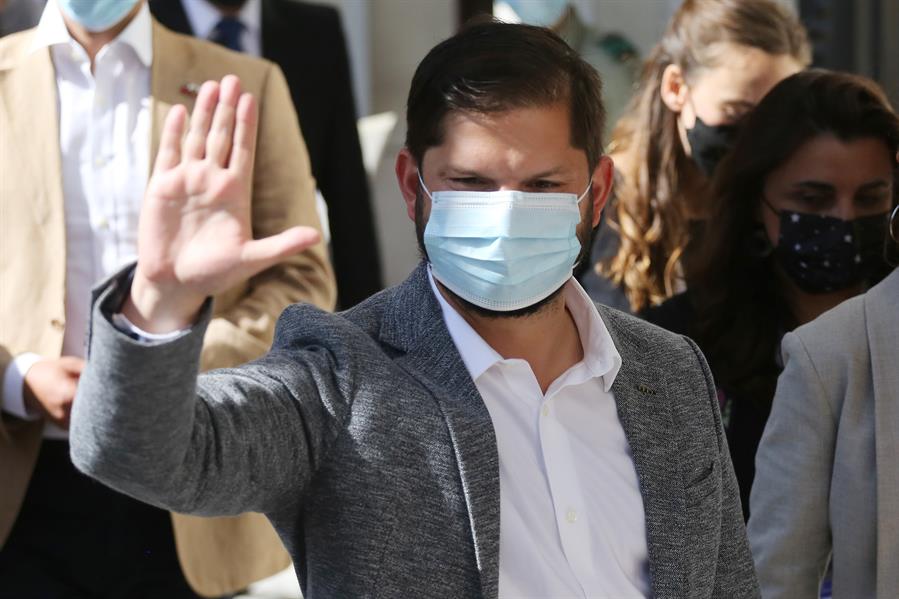This Sunday, December 19, Gabriel Boric Font, an independent deputy, became the youngest elected president in the history of Chile, beating candidate José Antonio Kast with a wide advantage. Boric, with 35 years, prevailed before his Republican Party contender, with 55.87% versus 44.13%.
The president-elect obtained more than 4.6 million votes, thus exceeding the amount achieved by former president Eduardo Frei, in 1993 (a little more than 4 million), and which made him the most voted. The great merit of Boric is that he did it through voluntary suffrage, on the other hand, Frei, with a compulsory vote.
Out of all predictions, the second electoral round had the highest participation recorded so far; 8.3 million people went to the voting centers, despite the problems of locomotion due to the lack of buses in many communes of the country, especially in Santiago and Valparaíso, regions where Boric obtained his highest vote in the first round.
After the complaints of the citizens, the command of the president-elect called on the government to deliver solutions, considering the extremely serious situation, for not offering the minimum conditions for the process, only 50% of all the buses were operational Therefore, the opposition presented a complaint to the Servel (Electoral Service of Chile).
Later, from the same command, a call was made to people to organize taxis and cars to transfer voters.
In this scenario and in the second round of actions, the figure of Ischia Siches, a Chilean doctor and politician, was fundamental as campaign manager. In this task, Siches proposed to travel the entire country collecting the voice of the people; their worries, fears, and longings for a new Chile with different needs. This strategy was key to the triumph. Boric achieved empathy.
Thus, the new president achieved something that no other candidate in Chile had achieved since the return to democracy in 1990: reversing the result obtained in the first round, at which point he obtained two points less than Kast.
The election that ended on Sunday sealed the end of the political dominance exercised in Chile for 31 years by the two great blocks of the center-left and center-right. Boric is the first elected president in this Chilean era outside both blocs since he is part of Approve Dignity, an alliance between the Broad Front, a left-wing coalition founded in 2017, and the Communist Party.
Boric was critical of Kast’s extremism, directly linked to Pinochet’s ideas, which were evident in his government program; but, in addition, from the right and from Sebastián Piñera (current president), mainly, due to the violation of human rights, the inadequate handling of the pandemic and the null ecological awareness, where personal interests have prioritized, as in the project Sundays.
However, he has also been critical of the former center-left Concertación that governed Chile between 1990 and 2010, made up of the Socialist Party and the Christian Democrats. However, it recognizes successes in the advancement of a more just society.
In this effort, his participation in the Agreement for Social Peace and the New Constitution, in November 2019, was essential, not only because a Constituent Commission was convened to draft a New Political Constitution, but also because it meant conciliation with groups that have always defended the Magna Carta created during the dictatorship.
This decision earned him criticism from his sector, including the distance from old political friends.
During this part of the campaign, supported by Siches and deputy Giorgio Jackson, the message of a social democracy managed to tune in with a wide sector of Chilean society disenchanted with the traditional parties.
Boric managed to confirm the acceptance of a new set of parties that regain political confidence and the true possibility of a change and transformation in the country.
These ideas about equality, well-being, and what happened in the Pinochet dictatorship were common topics of conversation in his home.
The bosom of a middle-class family from the southern part of Chile, with Croatian and Spanish ancestry, with a father who adheres to Christian democracy. Perhaps it is because of this influence that from his early years Boric began to show a political vocation, questioning the country’s centralism and individualism.
In 2011, as a law student at the University of Chile, in Santiago, he emerged as one of the leaders of the student movement that took to the streets, demanding the Chilean State for a dignified, free, and quality education, when Piñera was president. , in your first period. Those demands had great support from society.
A year later, he was elected president of the student federation of the same University. In 2013 he became an independent deputy for Magallanes; He called for reforms and was questioning the parliament.
To win these elections, he moderated his radical discourse to get closer to the forces of the center, and he succeeded.
Despite this, he always maintained his idea of transforming the pension system, increasing the incidence of the State in education and health, and attacking inequality with a tax reform that increases the tax burden on those with more economic power.
Boric stands as an open politician, a figure of transformative ideas, without dogmatism or sneer, but also as a president with the ability to unite to achieve solutions to a social and political crisis that has the country fractured.



















































































